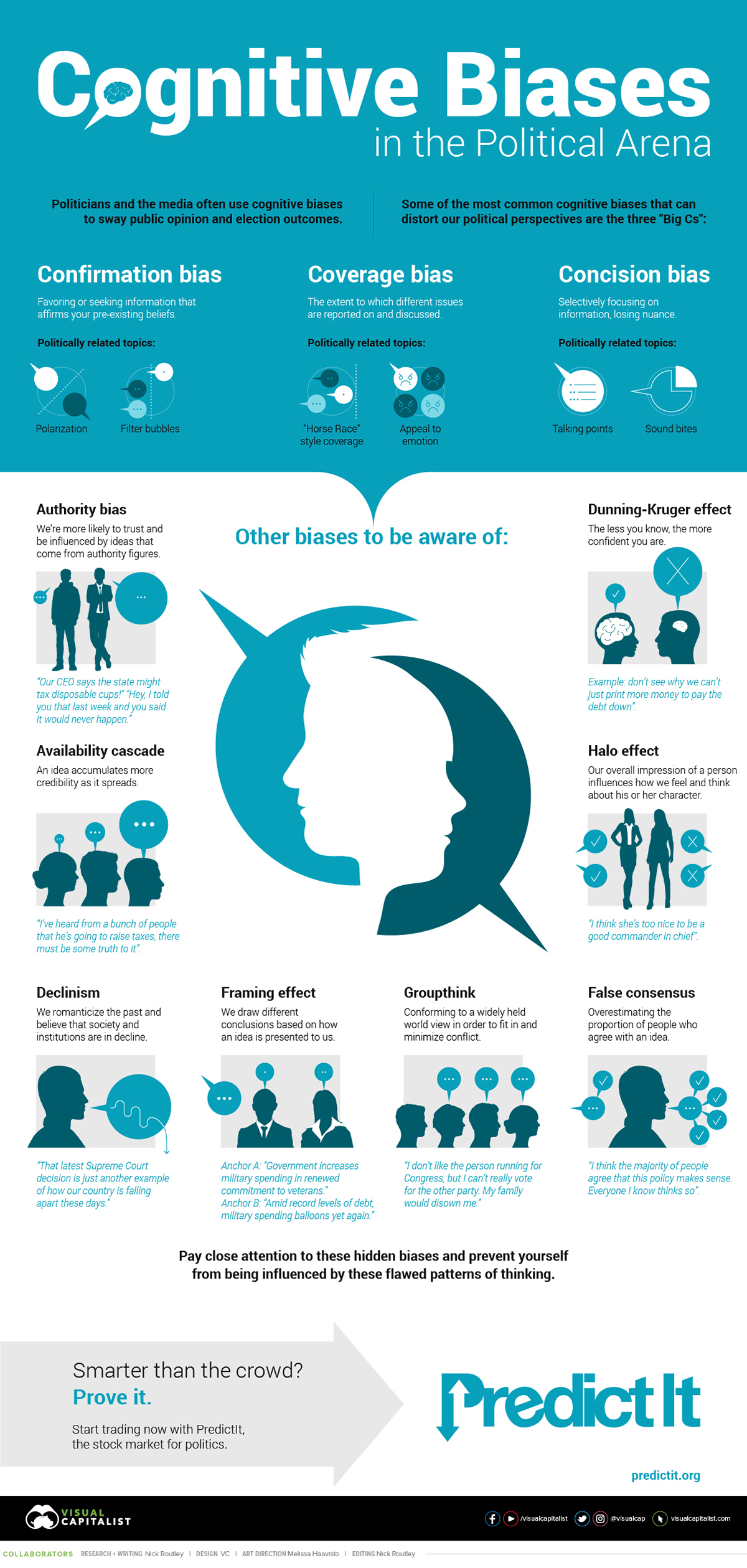
We have some bad news for you. You’re being played. Every day the media, politicians, influencers and the internet is manipulating your thoughts and opinions.
The primary job of politicians and the media is to influence public opinions in their favor. Let’s look at how they distort our perceptions by using common cognitive biases.

The Three Big C’s
Confirmation Bias is when information is presented that already bolsters your existing beliefs. This serves to polarize issues in politics.
Coverage Bias is what it sounds like, media companies include or exclude coverage based on what they want you to believe. Media companies will appeal to your emotions by only providing information based on what they’d like you to believe.
Conscision Bias means that selective clips, such as sound bites and talking points, are mentioned without context to intentionally confuse the public.
Other Forms of Cognitive Bias
Authority Bias means that we are more likely to trust someone who holds a position of authority and be influenced by their opinions. When information comes from an authority figure, people are more likely to take opinions as fact. For example, Dr. Birx and Dr. Fauci have been providing updates on the COVID-19 pandemic and the public has trusted them, even when they were wrong.
The Dunning-Kruger Effect is another example of cognitive bias. This means that the less information you have on a subject, the more confident you are. An example of this would be if someone did no research at all on coronavirus, yet announces they know a simple way to cure it.
Thoughts and ideas can also be more believable when they are widely spread. The same goes with misinformation. This cognitive bias is called “Availability Cascade.” Think back to your youth when your mother might have asked why you did something and you said, “because everyone does it.” Her response may have been to ask you if everyone decided to jump off a cliff, would you? She was trying to protect you from the stupidity of cognitive bias. Just because everyone is saying it, doesn’t mean it’s true.
The Halo Effect is another form of cognitive bias that ignores facts and decides how trustworthy someone is by an overall impression of their character. Bill Cosby was a funny comedian, loved by many Americans who grew up watching him on television. He sold us pudding pops and made jokes with children. Did that mean he didn’t drug and rape women? Apparently not.
Declinism is a form of cognitive bias in which a person believes the world is already going to hell in a handbasket and reminisce about the good ole’ days. Everything is bad and the world will never be the same. Debbie downers.
A Framing Effect is a cognitive bias in which people draw conclusions based on how it’s framed, packaged and presented to us. If Dateline leads you down a path to believe someone committed a murder, you’ll typically believe they are guilty of murder. However, that person’s defense attorney would frame the story differently.
Groupthink is an incredibly widespread form of cognitive bias, especially since the rise of the internet. Everyone wants to fit in and people will conform to widely held views to avoid receiving hate and being labeled as an outcast.
False Consensus is similar to Groupthink, except that the person overestimates the number of people who believe or agree with a concept or idea. A person may want to go with the majority opinion of a topic, but are mistaken in what the majority opinion actually is.
Be Aware of Cognitive Bias
By being aware of these types of cognitive bias you can avoid being played by the media and politicians. Staying true to yourself and your own beliefs is more difficult that it sounds when big media and politicians are constantly using these common forms of cognitive bias against you.
Cognitive bias is a flawed way of thinking that we can all fall victim to at times, but by being able to identify how this manipulation occurs, you can prevent yourself from falling prey to it – most of the time.